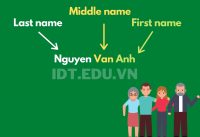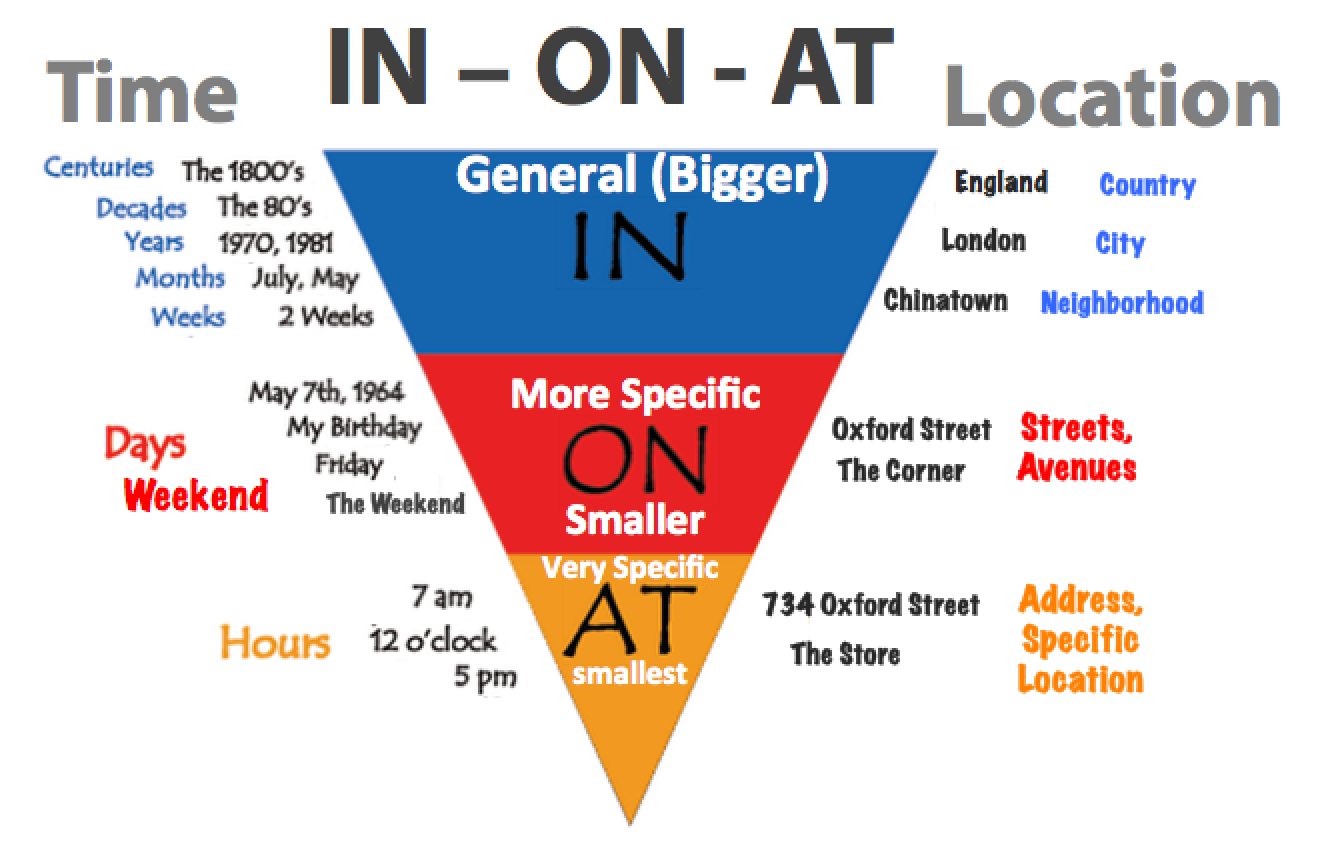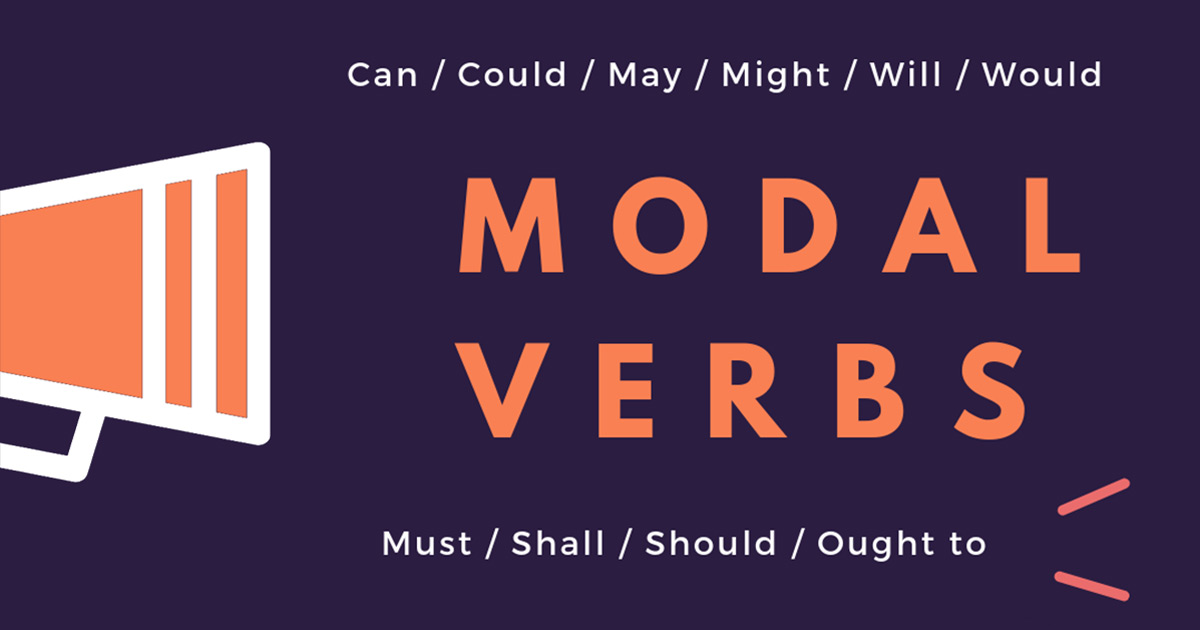Modal verb là gì, cách sử dụng và 5 bài tập ví dụ kèm đáp án
Modal verb hay còn được gọi là động từ khiếm khuyết hoặc khuyết thiếu. Đây được xem là điểm ngữ pháp khá quan trọng và xảy ra phổ biến ở những bài kiểm tra, các kỳ thi…
Chính vì thế việc nắm vững các bài tập Modal verb là cực kỳ cần thiết, hãy cùng ôn lại những kiến thức về điểm ngữ pháp này trong các bài tập dưới đây nhé!
I. MỘT SỐ MODAL VERB HAY GẶP
Động từ khiếm khuyết chính là một trợ động từ, các động từ này bao gốm: can – could, may – might, will – would, shall – should, ought to, have got to, be going to, be able to, needn’t, must…
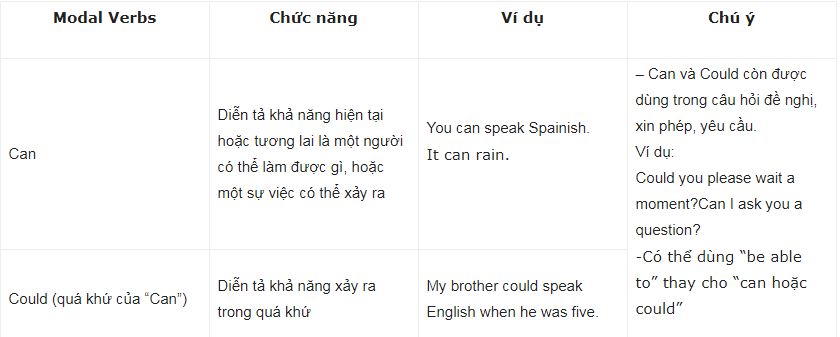
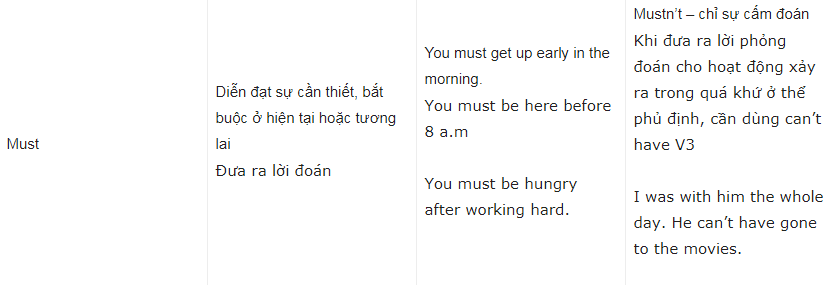
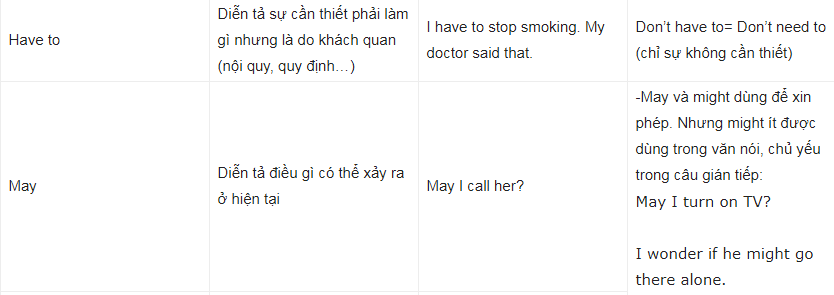

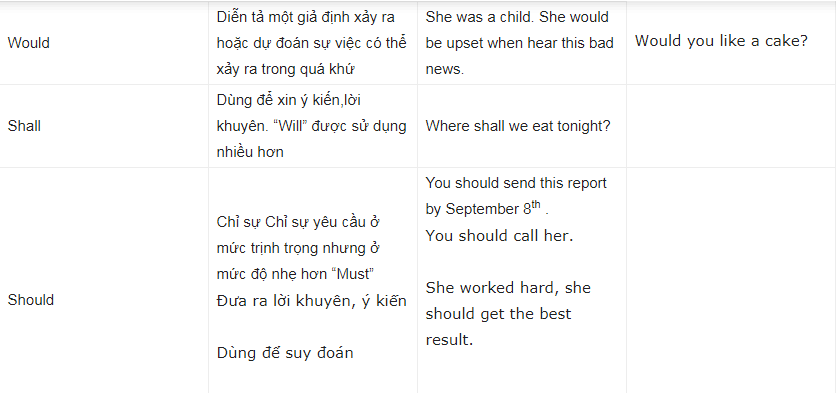
II. MỘT SỐ CẤU TRÚC CỦA MODAL VERB
1. Ở thì hiện tại và tương lai
- Khẳng định: S + Modal Verbs + V_inf
- Phủ định: S + Modal Verbs + not + V_inf
- Nghi vấn: Modal Verbs + S + V_inf?
2. Ở thì quá khứ
- Khẳng định: S + Modal Verbs + have + V3/ed
- Phủ định: S + Modal Verbs + not + have + V3/ed
- Nghi vấn: Modal Verbs + S + have + V3/ed?
III. CÁCH SỬ DỤNG
| Modal verb | Ý nghĩa | Ví dụ |
| must | Nghĩa vụ buộc phải tuân thủ
Kết quả logic / chắc chắn |
You must stop when the traffic lights turn red.
He must be very tired. He’s been working all day long. |
| must not | Ngăn cấm | You must not smoke in the hospital |
| can | Có khả năng
Sự cho phép Khả năng |
I can swim
Can i use your phone please? Smoking can cause cancer. |
| could | Có khả năng trong quá khứ
Cho phép một cách lịch sự Khả năng |
When i was younger i could run fast.
Excuse me, could i just say something? It could rain tomorrow ! |
| may | Sự cho phép
Có khả năng xảy ra |
May i use your phone please?
It may rain tomorrow |
| might | Cho phép một cách lịch sự
Có khả năng xảy ra |
Might i suggest an idea?
I might go on holiday to Australia next year. |
| need not | Không cần thiết / Không liên quan đến nghĩa vụ | I need not buy tomatoes. There are plenty of tomatoes in the fridge. |
| should / ought to | Một phần nghĩa vụ
Lời khuyên Kết quả logic |
I should / ought to see a doctor. I have a terrible headache.
You should / ought to revise your lessons. He should / ought to be very tired. He’s been working all day long. |
IV. BÀI TẬP MODAL VERB
– Bài 1: Hoàn thành những câu dưới đây theo các động từ: might, might not, must, mustn’t, can, can’t
1. Don’t stand up in the boat! You …………………. fall in the river!
2. You really …………………. start spending more time on your work.
3. That’s a really stupid idea! You …………………. be serious, surely!
4. Don’t be silly. You …………………. expect me to believe you!
5. I learn to fly! You …………………. be joking!
6. Sue says she’s stuck in traffic and she …………………. be late.
7. Tell Peter he. …………………. stay the night here if he wants to.
8. You …………………. realize it, but this is very important to me.
9. We’re not sure but we …………………. go to Prague for Christmas this year.
10. Bill cooked the lunch, so you …………………. expect anything special!
Đáp án:
| 1. might
2. must 3. can 4. can’t 5. must |
6. might
7. can 8. might not 9. might 0. mustn’t |
– Bài 2: Viết lại các câu sau bằng các từ đã cho trong ngoặc
1. I think you should give up smoking immediately. (had)
I think you ……………………………………………………………………………………………………..
2. I am sure you were surprised when you heard all the news (must)
You ………………………………………………………………….. when you heard the news
3. It’s very inconvenient if you can’t drive. (able)
……………………………………………………………………………………………………..
4. Someone almost certainly broke the window on purpose. ( must)
The window …………………………………………………………………………………………………….. on purpose
5. I am sure that the cat is in the house somewhere. (must)
……………………………………………………………………………………………………………..
6. It is possible that one of the men died on the mountain. (may)
One of the men …………………………………………………………………………………………………….. on the mountain.
7. It’s necessary for me to bring my passport. (have)
I ……………………………………………………………………………………………………..
8. It wasn’t necessary for you to do all this work (needn’t)
You …………………………………………………………………………………………………….. all this work
9. I am sure that John is not the thief. (can’t)
…………………………………………………………………………………………………………………..
10. I’m sure you are very tired after working so hard. (must)
You ……………………………………………………………………………………………………. after working so hard.
Xem thêm:
Đáp án:
1. I think you had better give up smoking immediately.
2. You must have been surprised when you heard the news.
3. It is very inconvenient if you aren’t able to drive.
4. The window must have been broken on purpose.
5. I am sure that the cat must be in the house somewhere.
6. One of the men may have died on the mountain.
7. I have to bring my passport.
8. You needn’t have done all this work.
9. I am sure that John can’t be the thief.
10. You must be tired after working so hard.
– Bài 3: Viết lại câu theo nghĩa tương tự bằng cách sử dụng các modal verb cho sẵn trong ngoặc
1.Perhaps Susan know the address. (may)
Susan ………………………………………………………………………….
2.The report must be on my desk tomorrow. (has)
The report …………………………………………………………………………………….
3.It was not necessary for Nancy to clean the flat. (didn’t)
Nancy …………………………………………………………………………………………
4.It’s possible that Joanna didn’t receive my message. (might)
Joanna ……………………………………………………………………..
5.I managed to finish all my work. (able)
I …………………………………………………………………………………..
6.The best thing for you to do is to sit down sit down. (better)
You ………………………………………………………………………..
Đáp án:
1.Susan may know the address.
2.The report has to be on my desk tomorrow.
3.Nancy didn’t need to clean the flat.
4.Joanna mightn’t have received my message.
5.I was able to finish all my work.
6.You had better sit down.
– Bài 4: Viết lại các câu sau bằng các từ đã cho
1. It was quite unnecessary for you to carry all those parcels home yourself.
You …………………………………………………………………………………………………………
2. I’m sure it wasn’t Mrs. Mai you saw because she is in Boston.
It can’t …………………………………………………………………………………………………………
3. Maybe John’s working this weekend.
John …………………………………………………………………………………………………………
4. I didn’t apologize. That was wrong of me.
I should …………………………………………………………………………………………………………
5. It wasn’t necessary for me to go out after all.
I needn’t …………………………………………………………………………………………………………
6. I’m sure that you didn’t lock the front door. Here is the key.
You can’t …………………………………………………………………………………………………………
7. It was careless of you to leave the windows open last night.
You shouldn’t …………………………………………………………………………………………………………
8. I’m sure Alison made arrangement. I recognized her voice.
It must …………………………………………………………………………………………………………
9. I’m sure he didn’t know that his brother was seriously ill.
He couldn’t possibly …………………………………………………………………………………………………………
10. I am sure it was Judy that I saw in town this morning
It must …………………………………………………………………………………………………………
Đáp án:
1. You needn’t have carried all those parcels home yourself.
2. It can’t have been Mrs. Mai you saw because she is in Boston.
3. John may work this weekend
4. I should have apologized. That was wrong of me.
5. I needn’t have gone out after all.
6. You can’t have locked the front door. Here is the key.
7. You shouldn’t have left the windows open last night.
8. It must have been Alison who made arrangement. I recognized her voice.
9. He couldn’t possibly have known that his brother was seriously ill.
10. It must have been Judy that I saw in town this morning.
– Bài 5: Điền vào chỗ trống với các modal verb: must have been, can’t(couldn’t) have been, have to/had to (be), didn’t have to (be)
1. He knows a lot about flying plane. He …………….. a pilot when he was young.
2. John …………….. at the bank until 10, so he arrived here five minutes ago.
3. We had enough foreign currency left at the end of the holiday, so I …………….. buy any more.
4. There …………….. an accident on South Street because the road is closed off.
5. You …………….. waiting long. After all, I’m only five minutes late.
6. Vera …………….. at the supermarket this morning. I didn’t see her there.
7. When she …………….. at the hospital? Early this morning.
8. Monica knew exactly what to do. I …………….. tell her twice.
9. I left a message on your answer phone last night. You …………….. out.
10. The fire alarm went and we …………….. out of the building in two minutes.
Đáp án:
| 1. must have been.
2. didn’t have to be. 3. didn’t have to. 4. must have been. 5. didn’t have to be. |
6. couldn’t have been.
7. have to be. 8. had to. 9. must have been. 10. had to be. |






